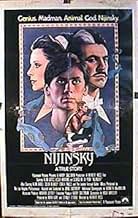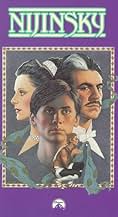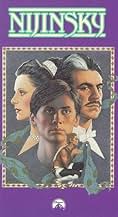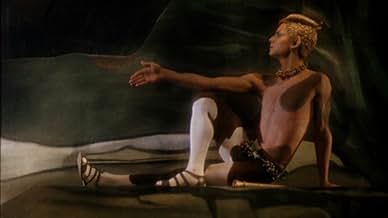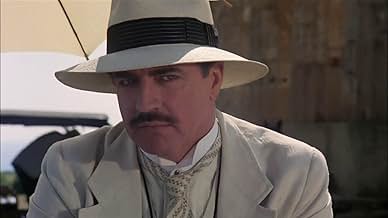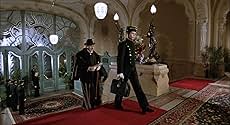अपनी भाषा में प्लॉट जोड़ेंThe story of Vaslav Nijinsky, who is widely believed to be one of the greatest ballet dancers of all time. Based on Romola Nijinsky's "Last Years Of Nijinski.The story of Vaslav Nijinsky, who is widely believed to be one of the greatest ballet dancers of all time. Based on Romola Nijinsky's "Last Years Of Nijinski.The story of Vaslav Nijinsky, who is widely believed to be one of the greatest ballet dancers of all time. Based on Romola Nijinsky's "Last Years Of Nijinski.
- निर्देशक
- लेखक
- स्टार
Tomaso Milian Jr.
- Young Boy on Beach
- (as Tomas Milian Jr)
फ़ीचर्ड समीक्षाएं
Nijinsky (1980) -
I couldn't actually remember whether I had checked the synopsis for this film beforehand and whether it might have been about a horse instead. My Mother certainly insisted on telling me that there was also a horse called Nijinsky all the way through it, despite it obviously being about the ballet dancer.
Either way, I knew nothing about the man, well played by George De La Pena and now I know something. He seemed like a bit of a diva actually and although it was clear that Sergei was using him for his talents, at least to some degree and that their love might not have been true, I felt that the dancer was probably doomed to come to the end that he did due to his passion and determination that would only ever be disappointed.
The character of Sergei, who was the lover and benefactor, didn't look like the Alan Bates I knew. I would still have kissed him though, without the use of a handkerchief between our lips, as was the oddity of their first meeting on screen.
There had always been something roguishly charming about Mr. Bates, especially when he had his beard and that came across in this great and interesting character, which was well delivered.
I would have liked to have seen more of Nijinsky actually dancing, although the Faun performance was a bit odd and lacklustre. More a sort of strange rolling around than the traditional beauty of a ballet that I'm used to. Actually, most of the dances were too strange for me and I was disappointed, having only recently started to get in to the art form via the likes of 'Swan Lake' and 'The Nutcracker', but also 'Car Men' and an old BBC2 performance I saw entitled 'Enter Achilles' from a season they did named '2 Dance'. Perhaps what was shown in this film would be received positively by those that knew more, but for myself as a layman it just came across as a bit forced and daft.
However I would have been very surprised if anyone could choreograph any kind of dance to Igor Stravinsky's (Ronald Pickup) God awful music, as it was performed in this film. It was painful to listen to.
Other than that, I thought that this story of Vaslav Nijinsky's life was produced fairly well. I would definitely have liked more sex and nudity, but I understood the restrictions that the studio would have been under at the time.
However I did also think that it was very poorly lit, making it very dark throughout and therefore lacking in definition at times, or perhaps it may have been the quality of the film used, but it definitely needed something.
In general it was interesting and it kept my attention, which many other films have failed to do. The final moments appeared a bit rushed as if they had sacrificed filming that segment of his life due to time constraints, because it was sad and that did lead me to thinking that it was a poor end for both Nijinsky and the film.
640.89/1000.
I couldn't actually remember whether I had checked the synopsis for this film beforehand and whether it might have been about a horse instead. My Mother certainly insisted on telling me that there was also a horse called Nijinsky all the way through it, despite it obviously being about the ballet dancer.
Either way, I knew nothing about the man, well played by George De La Pena and now I know something. He seemed like a bit of a diva actually and although it was clear that Sergei was using him for his talents, at least to some degree and that their love might not have been true, I felt that the dancer was probably doomed to come to the end that he did due to his passion and determination that would only ever be disappointed.
The character of Sergei, who was the lover and benefactor, didn't look like the Alan Bates I knew. I would still have kissed him though, without the use of a handkerchief between our lips, as was the oddity of their first meeting on screen.
There had always been something roguishly charming about Mr. Bates, especially when he had his beard and that came across in this great and interesting character, which was well delivered.
I would have liked to have seen more of Nijinsky actually dancing, although the Faun performance was a bit odd and lacklustre. More a sort of strange rolling around than the traditional beauty of a ballet that I'm used to. Actually, most of the dances were too strange for me and I was disappointed, having only recently started to get in to the art form via the likes of 'Swan Lake' and 'The Nutcracker', but also 'Car Men' and an old BBC2 performance I saw entitled 'Enter Achilles' from a season they did named '2 Dance'. Perhaps what was shown in this film would be received positively by those that knew more, but for myself as a layman it just came across as a bit forced and daft.
However I would have been very surprised if anyone could choreograph any kind of dance to Igor Stravinsky's (Ronald Pickup) God awful music, as it was performed in this film. It was painful to listen to.
Other than that, I thought that this story of Vaslav Nijinsky's life was produced fairly well. I would definitely have liked more sex and nudity, but I understood the restrictions that the studio would have been under at the time.
However I did also think that it was very poorly lit, making it very dark throughout and therefore lacking in definition at times, or perhaps it may have been the quality of the film used, but it definitely needed something.
In general it was interesting and it kept my attention, which many other films have failed to do. The final moments appeared a bit rushed as if they had sacrificed filming that segment of his life due to time constraints, because it was sad and that did lead me to thinking that it was a poor end for both Nijinsky and the film.
640.89/1000.
Purportedly factual biography of head strong and gay ballet dancer Nijinsky (George De La Pena). It deals with his slow descent into madness and his love for his manager (Alan Bates).
Lavish, well-done movie. I saw it way back in 1980 on opening night in a huge theatre in Boston. It was virtually empty. It was publicized to the hilt but it seems nobody had an interest in a ballet movie. Too bad. It was well-acted and the dancing by Pena was just superb.
My only complaint is the ridiculous R rating. It was given that because of a few (mild) kisses between Pena and Bates. Back in 1980 male on male kisses was enough to give a film an R rating and Hollywood wouldn't go any farther in portraying a gay relationship (purportedly Pena, who is straight, was petrified of doing these scenes). Everything else is PG material here. The rating really should be lowered for wider acceptance.
Worth catching.
Lavish, well-done movie. I saw it way back in 1980 on opening night in a huge theatre in Boston. It was virtually empty. It was publicized to the hilt but it seems nobody had an interest in a ballet movie. Too bad. It was well-acted and the dancing by Pena was just superb.
My only complaint is the ridiculous R rating. It was given that because of a few (mild) kisses between Pena and Bates. Back in 1980 male on male kisses was enough to give a film an R rating and Hollywood wouldn't go any farther in portraying a gay relationship (purportedly Pena, who is straight, was petrified of doing these scenes). Everything else is PG material here. The rating really should be lowered for wider acceptance.
Worth catching.
If you, like me, are a Nijinsky fan, go ahead and watch it
But I have some complaints
The film is great, don't get me wrong, but I felt like it lacked more simple scenes between Diaghilev and Nijinsky More on why they fell in love How it all started They focus a lot on the consequences of this, but not on the reasons of why it happened in the first place
I mean,yeah,love doesn't have a reason to happen and blah blah blah But when we start the movie, they already like each other Personally, I found the film a bit massive, as it lacks lighthearted scenes
I understand that they chose to focus on the tragedy, but if they really showed the reason that made Nijinsky stay, the love between them, I believe the moment where it all falls apart would be even better I would also have liked to have seen a scene of Nijinsky protecting Diaghilev, in addition to just Diaghilev protecting him, and to show Nijinsky's reaction to this protection, too More physical and emotional intimacy beyond arguments
Furthermore, they did not mention anything about WWI, which was a big reason for Nijinsky's downfall, as he was considered an enemy as he was in Belgium, due to his Russian citizenship
Despite this, overall, the film is great The costumes are realistic, the performances, in my opinion, are great and they managed to demonstrate the consequences very well, even with the lack of reasons.
The film is great, don't get me wrong, but I felt like it lacked more simple scenes between Diaghilev and Nijinsky More on why they fell in love How it all started They focus a lot on the consequences of this, but not on the reasons of why it happened in the first place
I mean,yeah,love doesn't have a reason to happen and blah blah blah But when we start the movie, they already like each other Personally, I found the film a bit massive, as it lacks lighthearted scenes
I understand that they chose to focus on the tragedy, but if they really showed the reason that made Nijinsky stay, the love between them, I believe the moment where it all falls apart would be even better I would also have liked to have seen a scene of Nijinsky protecting Diaghilev, in addition to just Diaghilev protecting him, and to show Nijinsky's reaction to this protection, too More physical and emotional intimacy beyond arguments
Furthermore, they did not mention anything about WWI, which was a big reason for Nijinsky's downfall, as he was considered an enemy as he was in Belgium, due to his Russian citizenship
Despite this, overall, the film is great The costumes are realistic, the performances, in my opinion, are great and they managed to demonstrate the consequences very well, even with the lack of reasons.
Whatever the facts may have been, the screenplay writers here have chosen to interpret the end of Nijinsky's dazzling career and his descent into madness, as being caused by the end of his romantic relationship with Diaghilev. An interesting premise - that what appeared to most people to be a simple case of a "dirty old man" exploiting a young man's ambition (or perhaps an ambitious young man exploiting an older man's lust), was in fact a genuine love affair. They weren't using each other, they genuinely loved each other.
Sadly, in 1980, it appears the film-makers were not brave enough to explore this fully enough for the film to work. The characters talk about passion a lot, but we don't see it much. Indeed the only love scene between the two men involves a couple of little kisses with a handkerchief held to their lips! How wonderful it would have been to see these two men genuinely passionate with each other - physically and spiritually - and how they managed to turn that passion into great works of art. This way we could understand Nijinsky's devastation when Diaghilev rejects him. As it stands, it seems to come from nowhere.
This is no fault of the actors. Both Alan Bates and George De La Pena do what they can, with the scenes that they have. What a shame the film wasn't made a few years later, when gay relationships could be explored on screen more completely. This could have been one hell of a film. As it is, the ballet reconstructions are excellent and the costumes superb. Performances are strong, with the possible exception of Leslie Browne, who is a little out of her depth here as the scheming rich girl chasing Nijinsky. She fared much better in Herbert Ross' earlier ballet film THE TURNING POINT.
Herbert Ross was a terrific choice to direct the film, having been a professional ballet director and choreographer, and the film has a superb sense of period and great style. But the heart is missing. The racing heartbeats of two men, and two great artists, madly in love.
Sadly, in 1980, it appears the film-makers were not brave enough to explore this fully enough for the film to work. The characters talk about passion a lot, but we don't see it much. Indeed the only love scene between the two men involves a couple of little kisses with a handkerchief held to their lips! How wonderful it would have been to see these two men genuinely passionate with each other - physically and spiritually - and how they managed to turn that passion into great works of art. This way we could understand Nijinsky's devastation when Diaghilev rejects him. As it stands, it seems to come from nowhere.
This is no fault of the actors. Both Alan Bates and George De La Pena do what they can, with the scenes that they have. What a shame the film wasn't made a few years later, when gay relationships could be explored on screen more completely. This could have been one hell of a film. As it is, the ballet reconstructions are excellent and the costumes superb. Performances are strong, with the possible exception of Leslie Browne, who is a little out of her depth here as the scheming rich girl chasing Nijinsky. She fared much better in Herbert Ross' earlier ballet film THE TURNING POINT.
Herbert Ross was a terrific choice to direct the film, having been a professional ballet director and choreographer, and the film has a superb sense of period and great style. But the heart is missing. The racing heartbeats of two men, and two great artists, madly in love.
I consider this film a failure. It fails at being a good biopic about Nijinsky, as the facts are far too skewed in this telling. Part of this is because source material was sorely limited at the time, but it doesn't even match up with what was available. It fails at being a dance movie, as what little ballet is shown is unfortunately not filmed very well, with the worst offense being a choppy slow motion effect that ruins the climactic leap at the end of Spectre of the Rose. I can't fathom why the director, a former choreographer, would make such a stupid choice.
Those of you saying this film was "brave" for attempting to portray a gay romance on screen in 1980 - did we watch the same movie? The only kiss between two men in this involves a goofy and obvious gimmick with a tissue to avoid censorship, and besides that the relationship between the real Diaghilev and Nijinsky was far from romantic. It was an exploitative business transaction that quickly soured when Nijinsky decided to marry.
The film tries to cover a period of ten years in just two hours, which leads to idiotic insinuations, such as Nijinsky going mad because he sexually repressed himself, or because his brother was "insane" . The man was a schizophrenic; nothing specific actually caused his illness. The stress of not being able to find work after Diaghilev fired him for marrying Romola likely did exacerbate it along with other factors. But the fact remains that he was married to her for five years and had a child by her before he was institutionalized; saying he went crazy because of their marriage is ridiculous.
Okay, I'll throw the non-history buffs a bone. I know that most biopics play fast and loose with the truth, but this movie is just not good or enjoyable to watch even as a piece of entertainment. The acting is often melodramatic to the point of being cringe-worthy. Alan Bates as Diaghilev is good, but George de la Pena and Leslie Browne are very poorly cast as an overwrought Nijinsky and simpering Romola. The script contains a lot of really dumb moments (I laughed hysterically during the film's only "sex scene" which is soundtracked with Stravinsky's The Rite of Spring, as well as the cabin-trashing scene that is reminiscent of Tommy Wiseau's The Room), scenes which don't make a whole lot of sense, and throwaway lines which don't factor into the plot or mean anything later. Nijinsky kisses his female ballet partner (who is presented as an amalgam fulfilling the roles his partner Tamara Karsavina and his sister Bronia filled in real life) on the lips, and I guess it's supposed to be our first sign that he is trying to rebel against his nature and Diaghilev, but the scene ends awkwardly and nothing actually comes of it. So what was the point of the scene?
If you are curious about Nijinsky and the Ballet Russes and really want to see a movie version, go watch the BBC production Riot at the Rite - it's free on YouTube. Otherwise, this movie is pretty much irrelevant and I can't recommend it.
Those of you saying this film was "brave" for attempting to portray a gay romance on screen in 1980 - did we watch the same movie? The only kiss between two men in this involves a goofy and obvious gimmick with a tissue to avoid censorship, and besides that the relationship between the real Diaghilev and Nijinsky was far from romantic. It was an exploitative business transaction that quickly soured when Nijinsky decided to marry.
The film tries to cover a period of ten years in just two hours, which leads to idiotic insinuations, such as Nijinsky going mad because he sexually repressed himself, or because his brother was "insane" . The man was a schizophrenic; nothing specific actually caused his illness. The stress of not being able to find work after Diaghilev fired him for marrying Romola likely did exacerbate it along with other factors. But the fact remains that he was married to her for five years and had a child by her before he was institutionalized; saying he went crazy because of their marriage is ridiculous.
Okay, I'll throw the non-history buffs a bone. I know that most biopics play fast and loose with the truth, but this movie is just not good or enjoyable to watch even as a piece of entertainment. The acting is often melodramatic to the point of being cringe-worthy. Alan Bates as Diaghilev is good, but George de la Pena and Leslie Browne are very poorly cast as an overwrought Nijinsky and simpering Romola. The script contains a lot of really dumb moments (I laughed hysterically during the film's only "sex scene" which is soundtracked with Stravinsky's The Rite of Spring, as well as the cabin-trashing scene that is reminiscent of Tommy Wiseau's The Room), scenes which don't make a whole lot of sense, and throwaway lines which don't factor into the plot or mean anything later. Nijinsky kisses his female ballet partner (who is presented as an amalgam fulfilling the roles his partner Tamara Karsavina and his sister Bronia filled in real life) on the lips, and I guess it's supposed to be our first sign that he is trying to rebel against his nature and Diaghilev, but the scene ends awkwardly and nothing actually comes of it. So what was the point of the scene?
If you are curious about Nijinsky and the Ballet Russes and really want to see a movie version, go watch the BBC production Riot at the Rite - it's free on YouTube. Otherwise, this movie is pretty much irrelevant and I can't recommend it.
क्या आपको पता है
- ट्रिवियाExecutive Producer Harry Saltzman had wanted to make a movie about Nijinsky for many years, first attempting to produce a version in 1970 with partner Albert R. Broccoli. The movie was started, but was never finished, it being cancelled by Broccoli and Saltzman. It is known as Nijinsky: Unfinished Project (1970). It starred Rudolf Nureyev, was written by Edward Albee, and directed by Tony Richardson.
टॉप पसंद
रेटिंग देने के लिए साइन-इन करें और वैयक्तिकृत सुझावों के लिए वॉचलिस्ट करें
- How long is Nijinsky?Alexa द्वारा संचालित
विवरण
बॉक्स ऑफ़िस
- US और कनाडा में सकल
- $10,47,454
- दुनिया भर में सकल
- $10,47,454
- चलने की अवधि2 घंटे 9 मिनट
- रंग
- ध्वनि मिश्रण
- पक्ष अनुपात
- 1.85 : 1
इस पेज में योगदान दें
किसी बदलाव का सुझाव दें या अनुपलब्ध कॉन्टेंट जोड़ें




